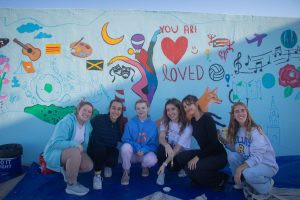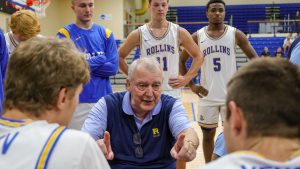As freshmen kick off their first semester, one RCC explores the perspectives of US immigration policies and citizenship.
“Out of the Melting Pot and Into the Fire” isn’t the tagline for the latest thriller movie, but the name of the Immigration in the U.S. Rollins Conference Course. This RCC is one of two offered to first-year honors students.
The class focuses on the history of migration in the United States and the overall experience of each immigrant group. Students analyze the roles that politics, economics, race, ethnicity, and gender play in the experiences and reception of immigrants.
The course is team-taught by Dr. Claire Strom of the history department and Dr. Dan Chong of the political science department to encourage students to examine immigration through both a historical and political science lens. Four international students in the class–from India, Nepal, Colombia, and Venezuela–offer a global perspective on immigration.
During fall orientation, the two professors, three peer mentors, and thirteen students went to the Hope CommUnity Center in Apopka to sit in on a citizenship class with immigrants studying for the U.S. Citizenship Test. The RCC viewed the questions on the test and learned how difficult it is for immigrants to gain citizenship due to language barriers and strict rules. After the citizenship class, the RCC sat in a circle with four immigrant teenagers and listened to their personal immigration stories. The teenagers described the obstacles they faced while trying to cross the border and the daily struggles they go through as young immigrants in the United States.
The students are currently compiling their personal family immigration histories by searching on www.ancestry.com and interviewing family members. They’ll be organizing their findings into essays and placing their personal immigration histories in context with the general immigration experiences of that time.
Throughout the semester, the class will work on a tapestry project that will be on display in the Campus Center featuring different immigration stories of people in the community. They’ll also work in groups to research U.S. immigration policies and present their findings to their classmates.
Learning about immigration stories of their own families and of their community members allows students to gather information on the subject from sources other than the media and textbooks.
This approach to learning about immigration will give the first-years a glimpse of the hands-on and slightly non-conventional education they’ll receive in the next four years at Rollins.












Be First to Comment